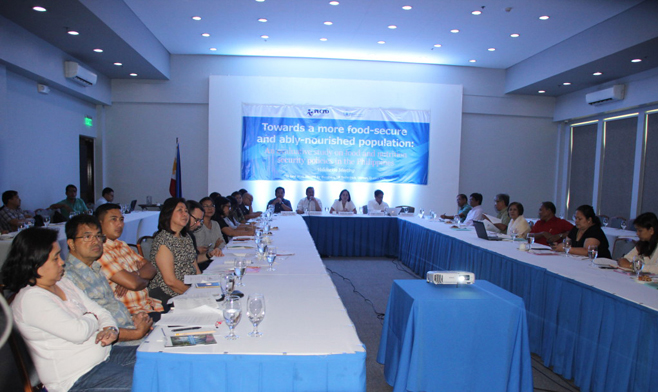PLCPD sees crucial role of Congress in achieving food and nutrition security in PH
June 20, 2016
The Philippine Legislators’ Committee on Population and Development (PLCPD) presented before stakeholders the results of an evaluative study on three landmark laws on food and nutrition security (FNS) in the Philippines.
Conducted in partnership with the Institute for Strategic and Development Studies (ISDS) and with the support of World Food Programme (WFP) Philippines, the study looked into the implementation of three crucial FNS-related laws and focused on recommendations for Congress.
Opening the program, PLCPD Vice Chair for Visayas and House of Representatives (HOR) Special Committee on Food Security Chair Sharon Garin, stressed the need to prioritize meaningful legislation on for food and nutrition security because of the reality that while almost majority of Filipinos belong to the agricultural sector, majority of the poorest Filipinos are farmers and fisherfolk. Moreover, she cited that agriculture contributes only a little more than a tenth to the country’s Gross Domestic Product or GDP. She also welcomes the Sustainable Development Goals, crafting of the next mid-term national development plan, and policy agenda formulation of the next administration and Congress as entry points for furthering the advocacy for FNS.
Presented by ISDS senior research associate Allan Delos Reyes, the paper looked into the implementation of the Nutrition Act of the Philippines, the Presidential Decree that created the National Nutrition Council (NNC), the National Food Authority Act of the Philippines, the Agriculture and Fisheries Modernization Act (AFMA), and subsequent legislation or executive policies that further amended them. Mr. Delos Reyes focused on the mandates created by law, the structures created, policy directions and programs, as well as funding that involved agencies have invested in their implementation.
The findings reveal that in the implementation of the laws, agencies may have clear mandates on paper but overlap in actual implementation. Moreover, since their enactment, there has been no strategic funding and investment in resources including human resource to ensure that the mandates are carried out efficiently and effectively. Finally, the devolution of services created by the Local Government Code of 1991 has had less than desirable implications on food and nutrition security because not all local government units (LGUs) have the capacity to implement the programs mandated by various laws.
Prof. Domingo Angeles of the University of the Philippines Los Baños Interdisciplinary Studies on Food Security, Congressional Policy and Budget Research Department Service Director Novel Bangsal, and PLCPD Vice Chair for Luzon and HOR Committee on Agrarian Reform Chair Teddy Brawner Baguilat shared their reaction on the paper presented. Contributing to the refinement of the assessment and recommendations, Professor Angeles and Director Bangsal provided additional input on the aspects that needed to be stressed or mentioned more, including the lack of long-term strategies and planning for FNS, looking at food production vis-à-vis consumption, reviewing the government’s priority of self-sufficiency, and including environmental aspects, among others.
For his part, Representative Baguilat stressed the recommendations mentioned in the paper, such as the enactment of the National Land Use Act (NLUA), a bill that has been filed and re-filed every Congress and is seen to contribute not only to the harmonization of land use in the country but also to food and nutrition security as it seeks to protect prime agricultural lands. For Congressman Baguilat, the other important role of Congress that needs to be exercised and enhanced—for both legislators and Congress secretariat—is review and oversight, such as the one that needs to be done for AFMA. Finally, he stressed the need to find ways to strengthen the partnership between national agencies and local government agencies in the implementation of laws for FNS.
In the open forum, participants coming from executive and legislative branches of government, academe and civil society, brought up several points for refining the assessment and recommendations of the paper, including the role of women in FNS, inclusion of fisherfolk as an integral sector in FNS, investing in research and development in agriculture, promoting agriculture among the youth and education for farmers, and ensuring information dissemination down to household-level.
In his synthesis and closing, PLCPD’s executive director Romeo Dongeto highlighted the additional inputs to assessment and recommendations from the validation forum. In his closing, he stressed that while food and nutrition security is multi-faceted and needs multi-sectoral and whole-of-society approach to be achieved in the country, Congress has a crucial role to play—whether in the form of new policy proposals, pro-active and purposive budget allocation, or review of existing laws and exercise of oversight function on the implementation of laws. Finally, Mr. Dongeto recognized that while the focus of the paper is Congress, it is equally important to work with national government agencies and local government units to ensure meaningful implementation of food and nutrition security policies.
The validation forum was held last June 16 at the Microtel by Wyndham, Diliman, Quezon City.

